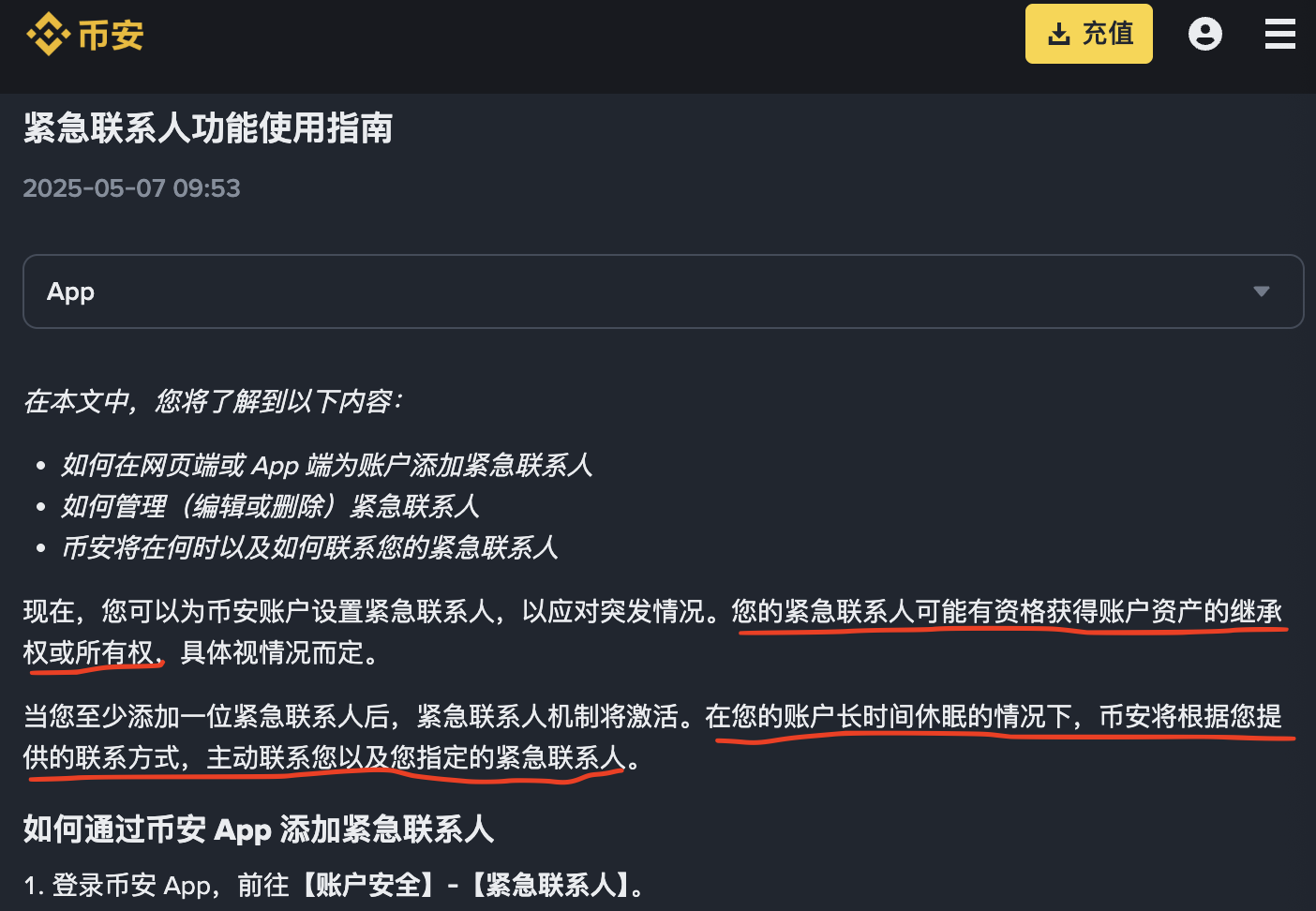Recently, a KOL in the crypto circle posted on a self-media platform that Binance has added "emergency contacts" and "inheritance" functions in the updated APP version. At the same time, the blogger introduced that among the people who die in accidents every year in the world, a total of more than $1 billion worth of crypto assets will be held. If they are not transferred to relatives and friends in time before death, they will eventually be inherited by the exchange (crypto assets are stored in exchanges. If they are stored in cold wallets, they will eventually stay in the wallet address forever).
This new feature of Binance can indeed solve the problem of crypto asset inheritance for web3 practitioners, which is a great deed.
Before we formally begin to analyze the legal issues of inheritance of crypto assets, Lawyer Liu must reiterate that this article is only used as a popular science analysis and does not recommend or endorse any virtual currency or virtual currency exchange.
1. Practical approach to crypto asset inheritance
According to Binance's official website, users can set up emergency contacts in the app. If the user's account is dormant for a long time (the default is 12 months, and it can also be set to 2 years or 3 years, etc.), Binance will contact the user's designated emergency contact. The emergency contact may obtain the inheritance or ownership of the user's account assets.
Users can also delete or modify emergency contacts at any time.

2. Does Chinese law support the inheritance of crypto assets?
The above approach solves the problem of inheritance of crypto assets of dormant accounts in decentralized exchanges in practice. As a web3 legal practitioner, Lawyer Liu can't help but wonder whether this approach will encounter legal obstacles?
1. Whether virtual currency is property
In Lawyer Liu's article yesterday ( "On the Judicial Disposal of Virtual Currency, the People's Court Daily Published an Article: It Can Be Entrusted to a Third-Party Institution" ), it was mentioned that the Shenzhen Intermediate People's Court's submission to the People's Court Daily recognized the property attributes of virtual currency in civil and criminal laws. The specific reasons are:
First, in civil judgments, virtual currency is recognized to have characteristics such as exclusivity, controllability, and liquidity. Similar to virtual currency commodities, it should be recognized that virtual currency has property attributes.
Second, Article 127 of my country's Civil Code clearly stipulates: "Where the law has provisions on the protection of data and network virtual currency property, such provisions shall apply", proving that my country's Civil Code supports the protection of virtual property.
Third, Article 83 of the Minutes of the National Court Financial Trial Work Conference (Draft for Comments) also stipulates that "virtual currency has some attributes of online virtual property."
Fourth, in the field of criminal trials, the cases in the Supreme Court’s case library have also made it clear that virtual currency is property in the sense of criminal law and has property attributes in the sense of criminal law.
In addition, according to Lawyer Liu’s understanding of China’s virtual currency regulatory policy, in the “Notice on Preventing Bitcoin Risks” in December 2013, China defined Bitcoin as “a specific virtual commodity”; in the “Notice on Preventing Virtual Currency Trading Speculation Risks” in May 2021, virtual currency was defined as “a specific virtual commodity” (see: “ Summary of Regulatory Documents on Web3.0 Industry in Mainland China ”). The scope of “virtual commodities” has been “upgraded” from a single Bitcoin to a full range of virtual currencies.
In summary, virtual currency is property.

(II) Legal provisions on inheritance
In the inheritance chapter of my country's Civil Code, it is clearly stated that the scope of inheritance is the personal legal property left behind by a natural person upon death.
Since virtual currency is property under our country's laws, when a citizen holds it legally, he or she can of course arrange inheritance through a will.
Common forms of wills in the Civil Code include: handwritten wills, written wills, printed wills, audio and video wills, oral wills, notarized wills, etc. At the same time, a will can be withdrawn or changed at any time.
By setting up an emergency contact in the APP software and granting him the right to inherit the estate, this setting does not violate the principle of "autonomy of citizens" emphasized in our civil law, so it is also valid under Chinese law.
3. Difficulties in the Execution of Cryptographic Estates
However, there needs to be a twist here.
It is still the "9.24 Notice" issued by ten ministries on September 15, 2021, which clearly prohibits overseas virtual currency exchanges from providing services to mainland residents through the Internet. The ten ministries here include the Supreme People's Court.
If Zhang San sets his friend Li Si as his emergency contact in a virtual currency exchange APP, and can inherit his crypto assets worth 100 million yuan. In the end, after Zhang San passed away, Li Si did inherit the 100 million yuan of assets; when Zhang San's son Zhang Xiaosan (this name doesn't seem to be a good name) found out, he sued the court to demand that Li Si return the inherited assets to Zhang Xiaosan. The main reason is that virtual currency exchanges cannot operate in the mainland, so his father Zhang San's operation on the exchange software is invalid because it violates the mandatory regulations of mainland China (that is, the will is invalid), and Zhang San's estate should be inherited by statutory inheritance and inherited by Zhang Xiaosan.
So, how to break this situation? As a criminal lawyer, Lawyer Liu will no longer show off his shallow knowledge of civil law. Interested readers can discuss it privately.
Although virtual currencies represented by Bitcoin have been around since 2008, they are still a new technology in terms of law (not only in China, but also in the laws of all countries). Lawyer Liu believes that criminal and civil disputes and disputes related to virtual currencies will continue to emerge in the future, but we believe that some web3 entrepreneurs will continue to make positive progress. Whether actively or passively, the law will continue to adapt to new technologies and the changes they bring to the world.

